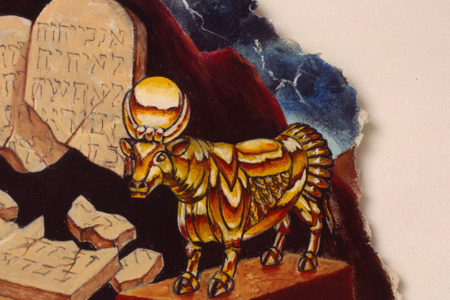The New Covenant
In the Scriptures, a covenant is a legally binding obligation of God for man’s redemption. It is God’s solemn pledge to fulfill His promises to those included in the covenant. Throughout the Old Testament, God gave a series of covenants to the nation of Israel providing material, national, and spiritual promises.
Whereas most of the other covenants are material and national in nature, the New Covenant is spiritual. It is an unconditional covenant, meaning that the fulfillment of its promises does not depend on the obedience of Israel, although, in time, the covenant will be the cause of their obedience (Ezek. 36:21–22). The fulfillment of the promises of the New Covenant depends totally on God’s faithfulness to His Word. God enforced this fact by stating, “I, the Lᴏʀᴅ, have spoken it, and I will do it” (Ezek. 36:36).
God also declared that the New Covenant is everlasting in nature (Isa. 61:8–9; Jer. 32:40; Ezek. 16:60; 37:26). Once Israel entered into the covenant relationship with God, it would continue in that relationship forever. The fact that God intended the New Covenant to be everlasting meant that it would never be abolished or annulled with Israel or by Israel.
The New Covenant’s Relationship to Israel
In the eighth century BC, the Prophet Hosea was the first to speak of the New Covenant that someday would replace and fulfill the other covenants. Seemingly in despair because of the Baal worship surrounding him (Hos 2:17), Hosea looked forward to a better time, for Jehovah had stated, “in that day will I make a covenant for them” (v. 18). Hosea stated that this covenant or testament had two aspects: an internal aspect, “I will betroth thee unto me in righteousness … and thou shalt know the Lord” (vv. 19–20); and an external aspect, “And in that day will I make a covenant for them with the beasts of the field … and will make them to lie down safely” (v. 18).
In the year 597 BC, after the majority of Jerusalem’s population had been taken captive to Babylon (Jer. 29:12), God revealed through Jeremiah further details of His New Covenant (Jer. 31:31–34). This is the key Old Testament passage concerning the New Covenant, although other references in the Old Testament are equally explicit. More than a century before Jeremiah, Isaiah declared that God would “make an everlasting covenant with them” (Isa. 61:8–9). Israel anticipated an everlasting covenant that would result in the world’s recognition of the people of Israel as a special people to God. The context of Isaiah’s prophecy, like that of Jeremiah’s, affirms that the fulfillment of the covenant will follow a time of sorrow and difficulty for Israel and will involve the regathering of the Jewish people to their own land (Jer. 32:37–41).
The Prophet Ezekiel, writing after Jeremiah and during the Babylonian captivity, confirmed the New Covenant and gave additional details, referring to it as “a covenant of peace” and “an everlasting covenant” (Ezek. 37:21–28). Ezekiel’s statements concerning the New Covenant are so specific that it is obvious they have not been fulfilled up to the present time. There is no intimation that the Old Testament saints expected anything other than a literal interpretation of the covenant.
The New Covenant clearly indicates that Israel will be regathered (Amos 9:13–15), never to be scattered again. This restoration of Israel will follow rather than precede the Second Coming of Christ to reign as “king over all the earth” (Zech. 14:9).
The provisions of the New Covenant are detailed in Jeremiah 31, where God declared that He would “make a new covenant with the house of Israel” (v 31). This covenant is in contrast to the Mosaic Covenant given by God to the Israelites after they came out of Egypt (v. 32). In the New Covenant God declared, “I will put my law in their inward parts [mind], and write it in their hearts, and will be their God, and they shall be my people” (v. 33). In verse 34, He indicated that He would “forgive their iniquity, and … remember their sin no more.”
The absolute certainty of the New Covenant is described in verses 35 and 36. It will be as sure as the natural laws that move the moon and stars and stir up the seas. As long as these laws of nature continue, God will continue His promises to Israel. This covenant is not conditional, like the Mosaic Covenant. The continuation of the sun and moon is a constant reminder that God is still keeping His promises to Israel and preserving them as a nation.
This remarkable prophecy given by Jeremiah almost 2,500 years ago is continued in chapter 33, verses l2-21, where God placed additional requirements on Himself before He could break His New Covenant with Israel. Jeremiah 31:31–37 and 33:19–21 show that God is dogmatic about the preservation of Israel. In essence, these verses state,
If the sun can be extinguished from shining, if the moon ever stops influencing the tides, if the stars can be made to flicker and die, if day and night suddenly disappear, if mankind can successfully measure the universe … then Israel shall cease to exist!
What a statement! If all of these natural ordinances fail, then God can break His covenant with Israel. However, business will go on as usual as long as the universe continues as it has since the fall of Adam and Eve. As long as we have day and night, seas and stars, sun and moon, God will keep His covenant with the seed of Abraham, Isaac, and Jacob, thus ensuring their existence in accordance with His clear, firm Word.
Following is a list of the major components of the New Covenant as recorded by various Old Testament prophets:
- The covenant was made with the nation of Israel (Jer. 50:4–5).
- The covenant is in contrast to the Mosaic Covenant, which depended on the obedience of Israel for its fulfillment (Jer. 31:32).
- The major portion of the covenant will be fulfilled after the Great Tribulation (Jer. 30:7).
- The New Covenant will take the place of the Mosaic Covenant and will be written “in their hearts” instead of on tablets of stone (Jer. 31:33).
- The New Covenant will feature great spiritual blessings for the people of Israel (Ezek. 36:26–30).
- The New Covenant will reveal the glory of God so that it will no longer be necessary to witness to others (Ps. 72:19; Jer. 31:34).
- The New Covenant will feature forgiveness, grace, and blessings (Jer. 31:34).
- In the covenant God promised the indwelling of the Holy Spirit (Ezek. 36:27; Joel 2:28–29).
- There will be universal knowledge of Jehovah among the people of Israel (Jer. 31:34).
- The covenant includes a promise that Israel will obey God and have a right attitude toward Him forever (Jer. 32:39–40).
The provisions of the New Covenant are so detailed that it is apparent to any careful observer that it has never been fulfilled in the past and is not being fulfilled at present.
God promised that Israel will be regathered following His judgment of them, and they will return to their ancient land “to dwell safety” (Jer. 32:37–41). This everlasting covenant promises that God “Will not turn away from doing them good” (v. 40). At the conclusion of the covenant God stated, “I will plant them in this land assuredly with my whole heart and with my whole soul” (v. 41). The New Testament references to Israel’s New Covenant point to a future fulfillment. In Romans 11:26, the Apostle Paul wrote, “And so all Israel shall be saved.” This passage helps to date the time of the fulfillment of Israel’s New Covenant by pointing to the time of Christ’s return as their “Deliverer.” Interestingly, most amillennialists ignore this passage. One of the prominent New Testament references to the New Covenant is found in Hebrews 8. The writer stated that the New Covenant is better than the Mosaic Covenant. In verse 6 he wrote, “he [Christ] obtained a more excellent ministry, by how much also he is the mediator of a better covenant, which was established upon better promises.” Simply stated, the New Covenant is superior to the old Mosaic Covenant. In verses 7–13 the writer referred to Jeremiah 31:31–34 to confirm his statements. The writer did not interpret the passage as being fulfilled today. Instead, he said that the Old Testament itself anticipated that the Mosaic Covenant would become obsolete.
Hebrews 10:16–17 also refers to the New Covenant. The details of the covenant relate primarily to Israel’s future in the Millennial Kingdom, when the nation will experience spiritual revival. The knowledge of Christ will be universal, because Christ will be living bodily on the earth. Israelites will be regathered to their own land and will fulfill God’s promises during the Millennial Kingdom.
The New Covenant’s Relationship to the Church
The New Testament indicates that the church is also related to the New Covenant. There are five direct New Testament references to the New Covenant: Luke 22:20; 1 Corinthians 11:25; 2 Corinthians 3:6; Hebrews 8:8; 9:15. In these passages the word testament is synonymous with the word covenant. There are a number of other New Testament references to the New Covenant, and some do not use the word new: Matthew 26:28; Mark 14:24; Romans 11:27; Hebrews 8:10, 13; 10:16; 12:24. A proper understanding of the New Covenant is essential in understanding God’s purposes both for the church and Israel. The covenant is founded on the basic fact that Christ died on the cross for our sins, thereby freeing God to redeem, reconcile, and transform mankind apart from human merit or worthiness. The New Covenant is a covenant of grace that will be observed by God throughout eternity.
Although the Old Testament is silent concerning the relationship of the New Covenant to the church, several New Testament passages seem to indicate that the church is related to it.
First, the church participates in the communion service that Jesus established in the upper room on the night before His Calvary experience (Lk. 22:19–20; 1 Cor. 11:23–30). When Jesus instituted the Lord’s table, He said concerning the cup, “This cup is the new testament in my blood” (Lk. 22:20; cp. Mt. 26:28; Mk. 14:24; 1 Cor. 11:25). Obviously, Jesus was stating that the communion cup represents the New Covenant that God promised to Israel in the Old Testament, indicating that the church partakes of the New Covenant.
Second, the church partakes of the many spiritual blessings God promised as part of the New Covenant in the Old Testament. For instance, Christians have been regenerated ( Ti. 3:5), received forgiveness of sin (Eph. 1:7; 4:32; Col. 1:14), been indwelt by the Holy Spirit (1 Cor. 6:19), and received a new nature (Rom. 7:22; 2 Cor. 3:3; 2 Pet. 1:4).
Third, the Apostle Paul indicated that the apostles of the church functioned as ministers of the New Covenant (2 Cor. 3:6). Paul claimed to be a competent minister of the New Covenant.
Fourth, Jesus is “the mediator of the new covenant” (Heb. 12:24; cf. 1 Tim. 2:5).
The church also partakes of the spiritual blessings of the New Covenant. According to the Apostle Paul in Romans 11, during the Church Age a remnant of Israel is being saved by the grace of God through faith in Jesus Christ. Israelites who make up the remnant become members of the church through salvation and partake of the spiritual blessing of the New Covenant.
Conclusion
National Israel failed to enter into their New Covenant relationship with God at the Messiah’s First Coming.
During this present era of Israel’s blindness, the church is being grafted into a place where they can partake of the spiritual blessings of the New Covenant, along with the remnant of Israelites who are members of the church. However, this does not mean that the literal fulfillment of the New Covenant with Israel has been nullified. Their removal from a position of blessing is only temporary. When the Messiah returns to the earth, national Israel will be saved and returned to the place of covenant blessing (Rom. 11:23–27). At that time, Israel will enter fully into their New Covenant relationship with God, and all the promises of that covenant will be fulfilled completely with them.
The New Covenant extends salvation to all people of all ages who will believe in the Lord Jesus Christ. It also provides God’s blessings for people who do not deserve them—Jews and Gentiles, the church, and future believers in Christ. When Israel is restored in the Millennial Kingdom, it will be through an act of God’s grace and not something they deserve. They will experience the blessings of the New Covenant in the Millennium on the basis of the death, burial, and resurrection of Jesus Christ, just as the church experiences those blessings today.







